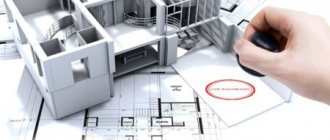The owners of the apartment can make it more convenient for themselves. Demolish some walls to create more space. Or divide a large room into several small ones so that everyone in the family has their own room.
But some things are prohibited. It will not be possible to enlarge the room with a balcony or remove the door in the kitchen if there is a gas stove. It is better to know about this before remodeling your apartment, so as not to waste time and energy on a project that cannot be brought to life.
We’ll tell you what exactly can and cannot be done during redevelopment, and show you what it looks like using our work as an example.
What not to do when remodeling an apartment
First of all, redevelopment cannot be done without approval. Redevelopment is those changes to the apartment that are reflected in its technical plan. Each apartment has this plan; it is stored in the BTI along with the registration certificate. And if you don’t yet have a technical certificate, you will still have to get it for redevelopment. This may be the case if the apartment is in a new building.
The technical plan shows the boundaries of all rooms, all doorways and window openings. All technical and plumbing equipment is also marked. If you are renovating and plan to cut a new opening in the wall or move walls, be sure to coordinate the work first. Otherwise, the redevelopment will be considered illegal.
The apartment plan shows whether a door is installed in the doorway or not. Therefore, if you want to remove the door and create a decorative opening, this is also a redevelopment. But you can simply replace doors without approval
Not all work can be agreed upon in principle. If they do not comply with building codes and sanitary rules - snips and sanitary regulations, permission cannot be obtained, and the completed redevelopment cannot be legalized. Let's talk about this in more detail.
Moscow Government Decree No. 508-PP - clause 10 of Appendix No. 1 lists all the work that is prohibited from being performed and cannot be agreed upon.
In the kitchen. The most stringent requirements for kitchens with gas stoves. Since gas is explosive, all work with gas equipment must be supervised by Mosgaz technicians. The kitchen must be isolated - making a studio if there is a gas stove will not work.
It is forbidden:
- combine a kitchen with a gas stove and a living room
- move a gas stove without permission from the gas workers
You can install glass doors between the kitchen with a gas stove and the living room. But they won’t be allowed to install accordion doors. The door should close tightly. Although no one forces you to keep it closed all the time
Redevelopment of a two-room apartment - options, photos and examples
In the bathroom. Bathroom is a common name for a bathroom and toilet. These are wet areas because water supply pipes run there. There is a risk that the pipes will leak, the faucet will break, or they will forget to turn off the water. To reduce the risk, waterproofing is placed on the floor, and requirements for the location of the bathroom are also established. It is impossible for neighbors’ living rooms or kitchen to be located underneath it.
It is forbidden:
- move the bathroom and toilet to the living part of the apartment
- expand the bathroom at the expense of the living room
Moving a bathroom into a living room or expanding it at the expense of it is possible only in one case - the apartment is on the ground floor. This means that there are no neighbors below and there is no risk of flooding them with water in the event of an accident
There are additional requirements that are important to comply with during repairs.
It is forbidden:
- trim ventilation ducts and make niches in them
- demolish thresholds in the toilet and bathroom
The threshold is located at the entrance to the bathroom, bathtub or toilet. It cannot be demolished and cannot be replaced with plastic. Height - 2 cm. Code of rules 29.13330.2011 “Floors”, clause 4.8
Loggia and balcony . In Moscow, it is impossible to combine a loggia and a living room if this is not initially provided for by the house design. Such work is not approved. When the partition is demolished, the heat will not be distributed correctly throughout the house. In addition, it is not always possible to install panoramic glazing on a balcony or loggia. If all balconies in the house have a railing at the bottom, this style must be followed.
It is forbidden:
- combine loggia and room
- glaze the balcony to the floor if the rest of the house has standard balconies, with a blocked bottom
Part of the wall between the loggia and the balcony can be demolished, but you still need to install a partition, for example, a double-glazed window from floor to ceiling
Load-bearing walls. The entire house is supported by load-bearing walls. Therefore, you need to work with them carefully. Large-scale interventions are prohibited. But small-scale projects like new doorways must be approved. Permission will not be given for all work - it depends on the type and series of the house. The conclusion on the possibility of redevelopment is prepared by the organization - the author of the house project.
It is forbidden:
- demolish load-bearing walls entirely
- cut openings in load-bearing walls without the consent of the author of the house project
- make new openings without reinforcement
An example of strengthening an opening in a load-bearing wall. It is called U-shaped. Strengthening one opening costs from 45,000 ₽
Heating. The heating system is used by all residents of the house. Therefore, this also has its own requirements and prohibitions - other residents should not suffer from your actions. An inspector from the Moscow Housing Inspectorate will check whether batteries are being used for other purposes, for example, as a source of hot water for heated floors.
It is forbidden:
- make heated floors using radiators
- transfer batteries to a balcony or loggia
- sew up heating risers and radiators without access to them
Drywall boxes may look more aesthetically pleasing, but they cannot be made. If the pipe becomes clogged or bursts, it will be very difficult to reach through the box.
Repair without errors: basic rules and common violations
What is considered illegal redevelopment of an apartment?
What was done without the permission of the administration.
Illegal redevelopment is construction work to change the configuration of an apartment, carried out without approval from the Bureau of Technical Inventory (BTI). For example, enlarging the bathroom or toilet at the expense of the corridor or creating a dressing room. This is considered redevelopment, and it must be agreed upon with the local administration.
How to install unauthorized redevelopment? It is enough to take a technical passport or floor plan from the BTI and compare its data with the actual layout of the apartment. That is, if the registration certificate indicates a separate bathroom, but the apartment has a shared bathroom and toilet, this is a discrepancy. This fact will be marked in the document with a red line, which already indicates illegal redevelopment. If the BTI plan coincides with what actually is in the apartment, then everything is in order and the layout is without violations.
On a note! If you installed sliding sliding doors in the room, re-pasted the wallpaper in the kitchen, or replaced wooden floors with chipboard with linoleum, this does not apply to the redevelopment of the apartment. “Cosmetic repairs” do not require approvals.
But moving the kitchen, impacting load-bearing walls and turning the bathroom into a living room can be fraught with trouble. It happened that during uncoordinated alterations, people were crushed under a piece of the wall. Or an entire entrance collapsed, followed by the evacuation of its residents. That is why housing inspectorates carefully monitor the condition of apartments, and in case of violations they apply serious sanctions to homeowners.
What are the dangers of illegal redevelopment?
If the owner of the apartment does not approve the redevelopment or does it in violation of the established rules, he will break the law. This entails a number of unpleasant consequences:
Fine. The Moscow Housing Inspectorate will impose a fine, regardless of whether you correct the shortcomings or not. Size - from 2000 ₽ to 2500 ₽.
Returning the apartment to its previous condition. If the redevelopment is done in violation of construction and sanitary standards, it cannot be legalized. Even after paying the fine. We will have to redo the repairs and return the apartment to its previous condition. The owner of the apartment does all this at his own expense.
Court. If you do not comply with the requirements of the Moscow Housing Inspectorate, it will sue. In addition to the fact that you will still have to return the apartment to its previous condition, you will have to pay all legal costs. The court may also impose an additional fine for failure to comply with its decision - astrent. If you delay repairs, you will have to pay this fine for each day of delay. In addition, bailiffs may prohibit leaving the country for a period until the court decision is executed. Even if the trip is needed for a good reason, you will not be able to leave.
Problems when selling. If you sell an apartment with illegal redevelopment, the price will be lower than for the same apartments without problems with documents. The fact is that redevelopment in any case will have to be either legalized or eliminated. Only this will fall on the shoulders of buyers. Therefore they will reduce the price. It is also impossible to quickly legalize redevelopment before sale; the Moscow Housing Inspectorate does not have any accelerated operating modes. Even if you pay extra.
All the consequences of illegal redevelopment
When consent is required for neighbors' redevelopment: legal regulation
Issues of obtaining consent to redevelop an apartment are regulated by the norms of the Housing Code (in particular, Articles 26-30).
According to the norms of the Housing Code, when renovating residential premises, the consent of neighbors is required in the following cases:
- If redevelopment work is carried out in a communal apartment , then it is necessary to obtain the consent of all neighbors. Moreover, the fact that they live in an apartment does not matter.
- If a person is the owner of a premises in an apartment building and redevelopment is impossible without annexing part of the common property for objective reasons, then the consent of neighbors must be obtained for such redevelopment (for example, the apartment owner decided to increase the living space by annexing part of the common corridor). Moreover, it must be signed by the owners of all premises in the house without exception. In this case, common property means, for example, common areas: corridor, building façade, staircases.
But if the redevelopment is planned only within the owner’s apartment and does not affect common property, then the consent of the neighbors is not required. Thus, the need to obtain consent disappears with minor design changes.
Permission for redevelopment must be obtained in the following cases:
- When renovating common areas : for example, arranging a vestibule.
- When changing the façade of a building : for example, when increasing the area of a balcony or the location of a window, when equipping a separate entrance.
- When remodeling a bathroom : for example, if the owner of an apartment would like to expand the bathroom at the expense of residential areas.
- When combining an apartment and an attic : for example, when turning an apartment into a two-level one.
Permission from neighbors is required only if they are the owners of the premises. Such consent is not required from employers or tenants. But the situation is complicated by the fact that all owners, even those temporarily absent, must give consent.
As for redevelopment in a communal apartment, consent is required even, for example, when it is necessary to expand a window in one’s own room (i.e., formally, the interests of neighbors are not affected in any way). But the legislation insists that in a communal apartment all neighbors are co-owners, and to carry out repair work, consent from all owners is required (similar to what is obtained when selling or donating a room).
What can be done during redevelopment
When remodeling, you can do everything that is not prohibited. Change the layout of rooms, move radiators, stoves and plumbing, make decorative podiums and niches. The safety of these works must be confirmed by a specialized organization - a design bureau with SRO approval. And then the Moscow Housing Inspectorate will check everything.
We will tell you what is allowed to be done during redevelopment using the most common examples.
You can demolish partitions if they are not load-bearing walls. You can dismantle any partitions inside the apartment. Of course, if these walls are not load-bearing. You can also build new ones from lightweight materials. It will help you create exactly as many rooms as your family members need. Or yourself. You can equip a dressing room - or, conversely, get rid of unnecessary storage room.
In the redevelopment project, demolished walls are displayed with a blue dotted line, and newly erected walls are shown with thick black lines. View the project.
You can combine the bathroom and toilet. A combined bathroom is one of the most common redevelopments. There is more space for arranging plumbing fixtures, cabinets, and a washing machine. And in general, such bathrooms look more spacious.
When combining a bathroom, it can also be expanded through the corridor. And on the ground floor - also at the expense of the living room or kitchen, if necessary for redevelopment. View the entire project
You can replace the bathtub with a shower. Some people prefer to lie in the bath, others prefer to take a shower. You can choose what will be in the bathroom at your discretion. The shower cabin occupies a smaller area, which means the bathroom will become even more spacious. However, if the size of the bathroom allows, you can install both a bathtub and a shower. The main condition is that you cannot make a drain shower where the water is drained into special holes directly in the floor.
You can install a ready-made shower cabin or a removable tray. The floor cannot be made of tiles. This is prohibited in Russia - SP 30.13330.2016
You can remove the partition between the kitchen and living room if you have an electric stove. You can make a kitchen-living room and generally remove the wall between the living room and the kitchen. Or leave part of the wall in the form of a stand or arch. It will be necessary to mark where the kitchen area ends and the living area begins. This can be done using different floor coverings or walls.
Combined kitchen-living room in the Donskoy Olympus residential complex. View project
You can move the kitchen to the hallway. This solution will allow you to turn the room where there used to be a kitchen into an additional bedroom or study. The kitchen area must be at least 5 square meters. m in one-room apartments and not less than 8 sq. m - in the rest.
The kitchen niche takes up very little space and is combined with the living room. View project
Moving the kitchen to the hallway when remodeling an apartment
You can remove the door and create an opening. A door between rooms is optional. They can be removed or the mechanism can be changed, for example from hinged to sliding. There is one exception when the door cannot be removed - if it is a door to a kitchen with a gas stove. Then the gas workers will not allow the door to be removed completely, and the Moscow Housing Inspectorate will not approve such a redevelopment.
The door to the kitchen can be removed if the kitchen has an electric stove. View project
Demolish the window sill block and install a French window . This is the only option to visually combine the living room and balcony. In some cases, you will need to leave part of the wall - check this when you order a redevelopment project.
Floor-to-ceiling windows are also called French or panoramic windows. There is immediately more light in the room. View project
on WhatsApp
Will they approve the redevelopment based on my sketch?
What documents need to be collected to redevelop an apartment? Is it possible to legalize redevelopment if it has already been done? Hello!











